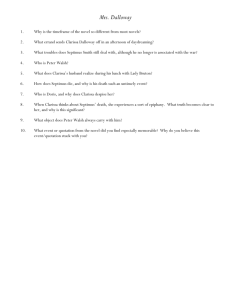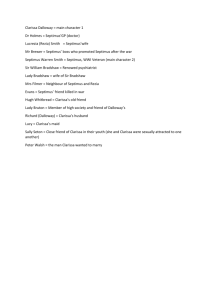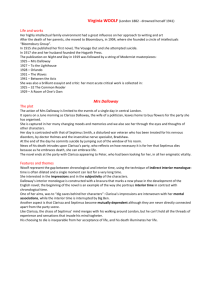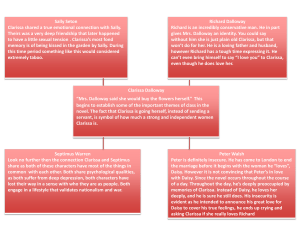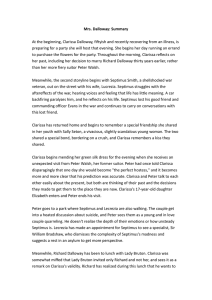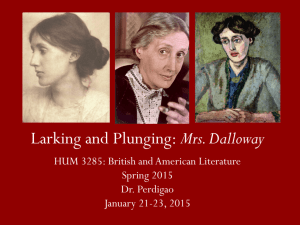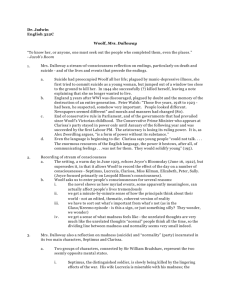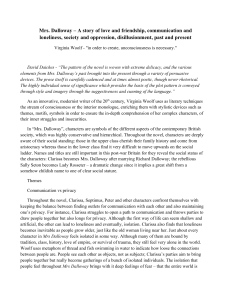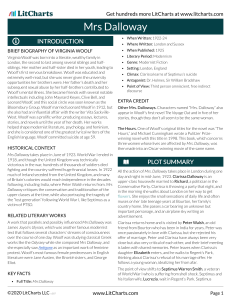Essay 4
advertisement
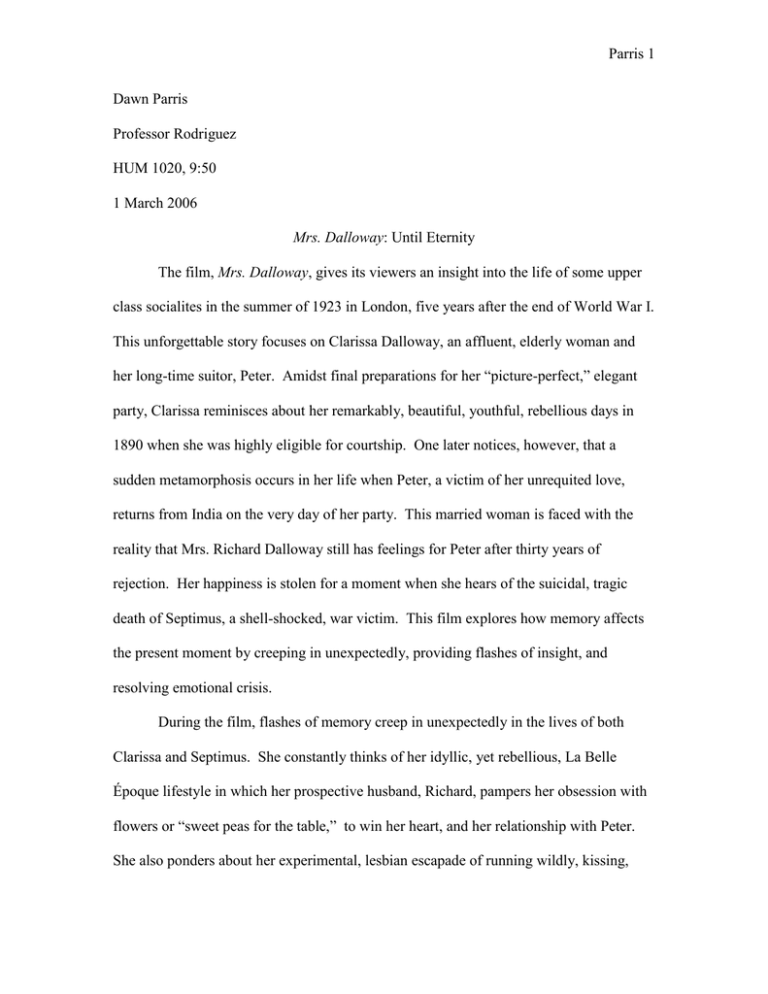
Parris 1 Dawn Parris Professor Rodriguez HUM 1020, 9:50 1 March 2006 Mrs. Dalloway: Until Eternity The film, Mrs. Dalloway, gives its viewers an insight into the life of some upper class socialites in the summer of 1923 in London, five years after the end of World War I. This unforgettable story focuses on Clarissa Dalloway, an affluent, elderly woman and her long-time suitor, Peter. Amidst final preparations for her “picture-perfect,” elegant party, Clarissa reminisces about her remarkably, beautiful, youthful, rebellious days in 1890 when she was highly eligible for courtship. One later notices, however, that a sudden metamorphosis occurs in her life when Peter, a victim of her unrequited love, returns from India on the very day of her party. This married woman is faced with the reality that Mrs. Richard Dalloway still has feelings for Peter after thirty years of rejection. Her happiness is stolen for a moment when she hears of the suicidal, tragic death of Septimus, a shell-shocked, war victim. This film explores how memory affects the present moment by creeping in unexpectedly, providing flashes of insight, and resolving emotional crisis. During the film, flashes of memory creep in unexpectedly in the lives of both Clarissa and Septimus. She constantly thinks of her idyllic, yet rebellious, La Belle Époque lifestyle in which her prospective husband, Richard, pampers her obsession with flowers or “sweet peas for the table,” to win her heart, and her relationship with Peter. She also ponders about her experimental, lesbian escapade of running wildly, kissing, Parris 2 dancing, boating, and picnicking publicly with Sally Borden, whom she later sees at her party and recalls her grandmother’s comments “don’t run Clarissa. Young ladies don’t run.” Septimus, on the other hand, continuously hallucinates about Evans, an ex-soldier and friend, who dies in his presence. Much to his wife’s intolerance, he sees the words “KREEMO TOFFEE” in the sky and says “there is no crime. There is no death. This world is clambering. Kill yourself. Kill yourself. No one kills from hatred.” Even though he has been awarded for bravery, Septimus’ memories repeatedly plague him of being dead, yet alive. He also thinks he has been a failure in the European war and has committed a crime. These flashbacks provide an insight into the frustrated empty lives of these two characters. Clarissa Dalloway says in the beginning of the film that “it is so dangerous to live for only one day!” which are reiterative, youthful thoughts. She seems to have inward fears of death and loneliness even though she has many acquaintances. In the case of Septimus, his doctors’ insistence of going to a mental institution for rest “to regain a sense of proportion” since he threatens to kill himself, is effortless. His wife loves him unconditionally and does not want her “delayed, shell-shocked” husband to be taken away from her. She tells the doctor that even though Septimus thinks he is “on trial for some terrible crime,” their relationship is somewhat normal at times. She fails to realize that Septimus’ mental instable is disadvantageous to his well being. Finally, memory is a liberating force for both of these characters. With life having many perspectives, love and death brings them ultimate freedom. Clarissa is sick but is still trying to make her British upper-class friends happy by inviting them to her party, with the hope that Peter, her longtime lover, will come. Even though she lives in a Parris 3 society with unresolved echoes of war, snobbery and gossip, she unselfishly thinks of other people. Her emphasis being, “that’s all I can do. Give people one night in which everything seems enchanted….And then they go home thinking. Oh, what fun it was! Oh, what a wonderful evening! How good it is to be alive!” By telling her husband, Richard, that he is so much nicer than she is and that she could have married Peter Walsh who is town,” indicates that there is no closure to this relationship because he still lingers in her heart.” Simultaneously, Peter’s confiding remarks to Sally while socializing at the party are, “I knew I loved her once and that it has stayed with me all my life and colored everything.” Eventually they bring an end to their nostalgic feelings when Clarissa tells Peter, “Here I am at last,” and they dance romantically. Clarissa is upset with her invitees Sir William Bradshaw and Lady Bradshaw for bringing the sad, dreadful news of Septimus’ death because they are instrumental in “forcing his soul and making his life intolerable.” After asking herself why “this young man on the edge of insanity threw his life way,” she finally understands that she does not pity him. She “feels like him, less afraid.” Septimus’ unfortunate ending gives her the courage to live on regardless of life’s obstacles!
